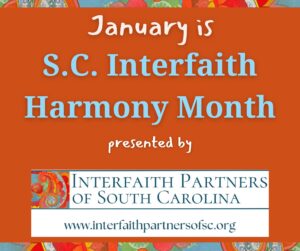If you are in an elected position, please review the following policy and at the bottom submit your name and agreement.
Interfaith Partners of South Carolina (IPSC) Conflict of Interest Policy (August 2024)
Article I – Purpose
The purpose of this policy is to protect the interests of Interfaith Partners of South Carolina (IPSC) when
(a) it is contemplating entering into a transaction or arrangement that might benefit the private interests of board members and
(b) avoiding any unethical financial, professional, or political gain on the part of such individuals. The intent of this policy is to supplement, not replace, any applicable federal, state, or local laws regarding conflicts of interest.
Article II – Persons Concerned
This statement applies to Board Members, Officers, Committee Members or anyone who can influence the governance and actions of IPSC. This includes anyone who makes financial decisions, might be referred to as “management personnel,” any individual or entity who has any compensation arrangement with IPSC or has proprietary information regarding IPSC. Compensation includes direct and indirect remuneration as well as gifts or favors that are not insubstantial.
Article III – Procedures
1. Duty to Disclose
In connection with any actual or possible conflict of interest, an interested person must disclose the existence of, or the potential existence, of a Conflict of Interest as it arises.
2. Recusal of Self
Any board member may recuse himself or herself at any time from involvement in any decision or discussion in which they believe they have a conflict of interest, without going through the process of determining whether a conflict of interest exists.
3. Investigating Conflicts
When a potential Conflict of Interest is disclosed, the Governing Board will then provide the individual with an opportunity to disclose all material facts. The Board will collect all pertinent information and question the involved parties. After disclosure, he/she will leave the meeting while the determination of a conflict of interest is discussed and voted upon. If it turns out that a conflict does not exist, the inquiry will be documented but no further action will be taken.
3. Addressing a Conflict of Interest
If the Board determines that a conflict of interest exists, they will take the appropriate actions to address the conflict. This may include (but not be limited to):
(a) prohibiting any Interested Parties from voting on any matter related to said Conflict of Interest or
(b) appoint a disinterested person or committee to investigate alternatives to the proposed transaction or arrangement.
4. Violations of the Conflict of Interest Policy
All conflicts of interest will be reviewed on a case-by-case basis. The board has full discretion to deem what action is appropriate and necessary for disclosed conflicts of interest. If the governing officers reasonably believe there was a failure to disclose an existing or possible Conflict of Interest, it shall inform the individual of the rationale for such belief and grant the individual an opportunity to explain the alleged failure to disclose the Conflict of Interest. After hearing the individual’s response and investigating further as warranted by the circumstances, the governing officers may take appropriate disciplinary and corrective action, including removal from the position at the organization.
5. Notice of Annual Statements
Every Board Member, and any other Interested Person must sign a Conflict of Interest Disclosure Statement upon said individual’s term of office, or other relationship with IPSC and must do so annually. Failure to sign does not nullify the policy. This affirms such person:
(a) has received a copy of the conflict of interest policy,
(b) has read and understands the policy,
(c) has agreed to comply with the policy, and
(d) understands Interfaith Partners of South Carolina is charitable and in order to maintain its federal tax exemption must engage primarily in activities which accomplish one or more of its tax-exempt purposes.
Article IV – Acknowledgment
By submitting the agreement form below, the individual named below affirms that s/he understand what constitutes a Conflict of Interest and understands the procedure for addressing them with IPSC, including their duty to disclose any known or potential conflicts of interest. The signee agrees to abide by the procedures set forth by this policy for the duration of their relationship with Interfaith Partners of South Carolina (IPSC).



